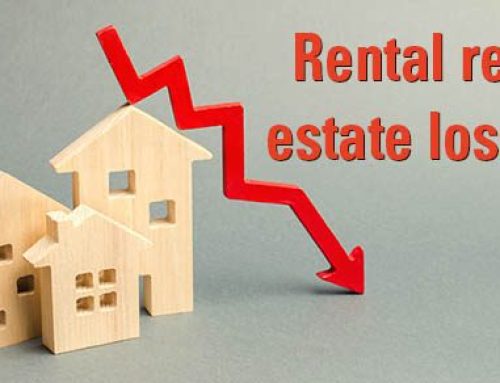 Are you sure you want to be a landlord? We have all heard stories about challenging experiences with tenants. Like the one tenant who took almost every fixture when they moved out: curtain rods, towel bars, carpet, you name it. Putting up with tenants can be a real pain. But the negative consideration of owning rental real estate is offset by appreciation of real estate markets and favorable tax rules that aren’t available for other types of investments. In fact, the favorable tax rules are a big reason why so many fortunes are made in real estate.
Are you sure you want to be a landlord? We have all heard stories about challenging experiences with tenants. Like the one tenant who took almost every fixture when they moved out: curtain rods, towel bars, carpet, you name it. Putting up with tenants can be a real pain. But the negative consideration of owning rental real estate is offset by appreciation of real estate markets and favorable tax rules that aren’t available for other types of investments. In fact, the favorable tax rules are a big reason why so many fortunes are made in real estate.
What you can write off
I’m sure you already know you can deduct mortgage interest and real estate taxes on rental properties. You are also able to write off all the other standard operating expenses that go along with owning a rental property: utilities, commissions paid to rental agents, legal and accounting fees, insurance, repairs and maintenance, yard care, home owner’s association dues, and so forth. You also can depreciate the cost of the residential building over 27.5 years. Say your rental property – not including land – cost $200,000. The annual depreciation deduction would be $7,273, which means if you don’t have debt on the property you could have that much in positive cash flow without owing any income taxes. This is a nice benefit, especially if you own several properties. Commercial buildings are depreciated over a 39 year period.
Beware of the dreaded passive loss rules
Things get a little more complicated if your rental property creates a tax loss (and most do). When you have this situation passive activity loss rules will usually apply. In general, passive activity rules only allow you to deduct passive losses to the extent that you have passive income from other sources. These other sources could be income from another rental property or gain on the sale of rental property. Without passive income, your rental losses become suspended losses you can’t deduct until you have sufficient passive income in a future year or dispose of the property to an unrelated party. In some cases you may not be able to deduct these losses for years. There are two exceptions to the passive loss rules:
- Your total income is small enough that you can use the $25,000 annual rental loss allowance, or
- You or your spouse qualify as a real estate professional.
Property owners with modified adjusted gross income of $100,000 or less may deduct up to $25,000 in rental real estate losses per year if they “actively participate” in the rental activity. To be considered an active participant you must satisfy the following requirements:
- You are involved in meaningful management decisions, including:
- Capital or repair decisions,
- Recruiting and selecting new tenants,
- Active involvement in the rental contract terms, and
- You must have more than a 10% ownership interest in the property.
This annual loss allowance is phased out for taxpayers whose modified adjusted gross income exceeds $100,000 and is eliminated entirely when it exceeds $150,000. Thus, it is unavailable for high-income landlords.
The other exception to the passive activity loss rules is the one for real estate professionals. Unlike the $25,000 allowance exception described above, this is a complete exemption from the rules. Landlords who qualify as real estate professionals may deduct any amount of losses as ordinary trade or business income. To be considered a real estate professional you must (1) spend more than 50% of your work time in real property trades or businesses in which you materially participate and (2) spend more than 750 hours of service during the year in real property trades or businesses in which you materially participate. In general people with full-time jobs outside of real estate do not qualify.
What if I have income?
Eventually your rent income will surpass your deductible expenses and your rental properties will start creating positive taxable income instead of losses. Of course, you must pay income taxes on the profits, but if you had suspended passive losses in earlier years, you now get to use them to offset your profits. Another benefit is that profit from rental real estate isn’t hit with self-employment tax, which applies to most other unincorporated profit-making ventures. The self-employment tax rate can be up to 15.3%. One disadvantage is, due to a provision in the 2010 health care legislation, passive income from rental real estate can get hit with an additional 3.8% Medicare surtax. This tax does not apply to real estate professionals and only hits upper-income levels. You will want to consult your tax advisor for how this could affect you.
Taxpayer-friendly rules when you sell
When you sell a property you’ve owned for more than a year, the profit (the difference between the net sales proceeds and the tax basis of the property after subtracting depreciation deductions) is generally treated as long-term capital gain. That means it will be taxed at a federal rate of no more than 20% (or 23.8% if you owe the 3.8% Medicare surtax). However, part of the gain, an amount equal to the depreciation that has been claimed as deductions, is subject to your ordinary income rate. It is important to remember that rental property appreciation isn’t taxed until you actually sell it. Good investment properties can generate the kind of tax-deferred growth investors dream about.
You also have the option of selling appreciated real estate on an installment plan by taking a note for part of the sales price. Then your taxable gain can be spread over several years. You can also charge the buyer interest on the deferred payment.
Do you remember those suspended passive losses we talked about earlier? You can use them to shelter gains from selling appreciated property.
Finally, the tax law allows real estate owners to sell appreciated properties while deferring the federal income tax hit. These types of transactions are called like-kind exchanges and are also known as Section 1031 exchanges. With a like-kind exchange, you swap the property you want to sell for a replacement property. By doing this you are allowed to “put off” paying taxes until you sell the replacement property. Be aware there are strict requirements on the proper structure of a 1031 exchange, consult your tax advisor.
The bottom line
As I said in the beginning of the article, all things considered, the tax rules for landlords are pretty favorable. But like with anything else, each person’s situation is unique and there are many factors that should be considered before jumping into the rental market. I recommend talking with your tax advisor to make sure owning a rental property is the best investment for you.
Melissa Hoaglund, CPA, is a tax manager with Dalby Wendland’s Grand Junction office. She specializes in individual and business income tax preparation and business consulting with special focus in the construction and oil and gas industries. Melissa is a member of the Colorado Society of CPAs and American Institute of CPAs. She holds an accounting degree from Colorado Mesa University.



